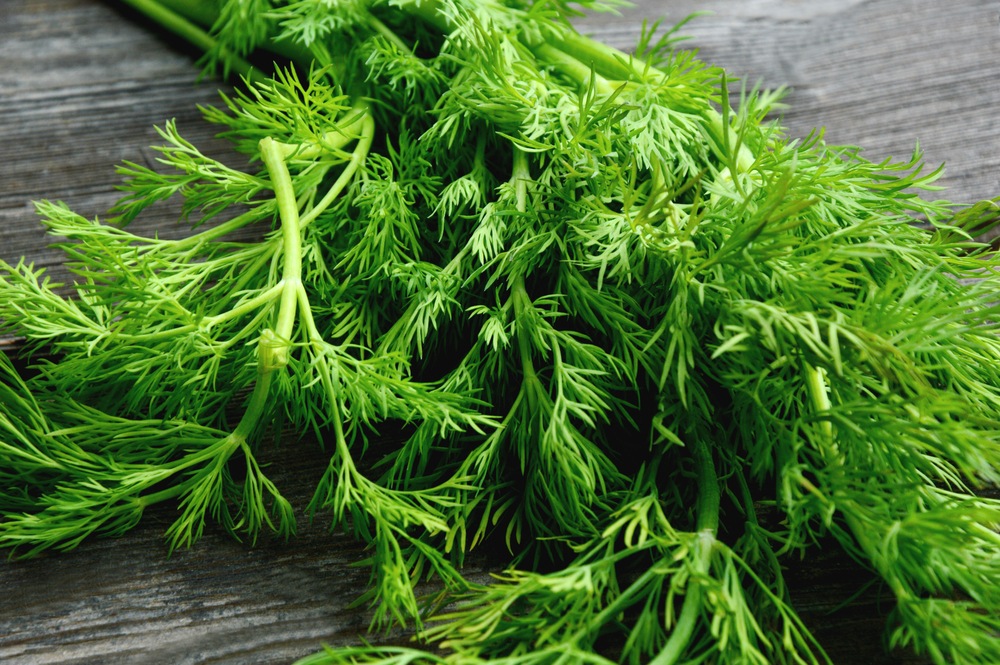Dill (Anethum graveolena) is a member of the parsley household, Apiaceae, and is secure to feed to canine, carefully. There is no such thing as a proof that signifies that dill causes issues in canine, however it’s all the time finest to feed it in small quantities, simply in case your canine does react badly to it.
You may all the time improve the quantity you feed over time, as soon as your canine doesn’t react badly to it. Dill is full of antioxidants and a bunch of nutritional vitamins and minerals. Some sources even recommend it really works properly to freshen the breath, though in case your canine does have pungent breath, it’s all the time value getting your vet to examine their mouth for any indicators of dental illness.


Is Dill Protected for Canine?
Dill is non-toxic to canine however as with all meals, it is best to all the time begin by feeding small quantities to make sure your canine doesn’t react badly to it. In case you are feeding one thing that accommodates dill, all the time examine further components to make sure they’re all secure on your pup.
In case your canine likes the flavour of dill, you possibly can sprinkle a bit of on prime of meals or put together a dill tea and it’ll present a pleasant dose of antioxidants in addition to varied nutritional vitamins and minerals to profit your pup’s well being.


Advantages of Feeding Dill to Canine
In addition to being non-toxic, dill presents a number of well being advantages to canine.
- Good for Digestion – Dill has anti-inflammatory and anti-flatulence properties. It has been utilized in conventional medicines to assist with colic in younger youngsters. In case your canine suffers from fuel, constipation, diarrhea, or different digestive considerations, a sprinkle of dill leaves might assist.
- Freshens the Breath –Giving your canine dill seeds to chew is assumed to enhance their breath. Nonetheless, dill gained’t assist unhealthy breath brought on by dental issues or an infection.
- Full of Antioxidants – Kaempferol and vicenin, that are each present in dill, are highly effective antioxidants. Specifically, kaempferol has been proven to assist fight sure sorts of most cancers (in people) and it additionally works as an anti-inflammatory.
- Dietary Worth – Guaranteeing your canine has a balanced food regimen helps guarantee their good well being. Whereas full canine meals provide really useful ranges of nutritional vitamins and minerals, canine can profit from having additional of a few of these vital components. Dill accommodates nutritional vitamins A and C in addition to copper, folate, iron and manganese.
Easy methods to Put together Dill for Canine
In addition to providing well being advantages to your canine, and being non-toxic, dill is simple to organize and feed to your canine. There are a number of methods you possibly can add it to your pup’s food regimen.
- Feed it Recent – Merely tear or minimize a number of dill leaves up and put them on prime of your canine’s meals. It does have a particular style, which suggests your canine won’t like the flavour, however that is the only method to feed the herb.
- Put together a Dill Tea – Boil up some water, put a handful of dill leaves within the boiling water, after which let it cool. Pressure the leaves out, in case your canine doesn’t like them, and both give the cool tea as it’s or pour it over your canine’s dinner to boost the style and the well being advantages of the meals.
- Add It to Different Supplementary Meals – If you happen to prepare bone broth or different liquid dietary supplements at residence, add dill to the components you employ to offer the complement an additional enhance. It takes hours to make bone broth, however it doesn’t require a lot intervention, and throwing a handful of dill leaves in might assist enhance your canine’s breath and digestion.


Different Useful Herbs for Canine
You may feed varied herbs to your canine, however it is best to all the time examine that it’s secure to feed.
If you happen to’re searching for herbs which might be excessive in antioxidants, rosemary is an efficient choice. Basil has anti-inflammatory properties in addition to antioxidants.
Chamomile is one other ingredient that’s regarded as useful in reducing anxiety naturally, and it has the additional benefit of being a muscle relaxant so is nice for canine with muscular ache. In case your canine likes the flavour, you possibly can add a small quantity of floor ginger to selfmade canine treats, as it will possibly cut back nausea.
Can Canine Eat Dill Pickles?
Though the dill and the cucumbers should not poisonous and each individually provide well being advantages to canine, you shouldn’t feed dill pickles. The cucumbers are pickled in a vinegary brine answer that has excessive ranges of sodium and is acidic. Dill pickles may cause abdomen upsets so are finest averted.
Dill pickles are sometimes additionally ready utilizing further ingredients like garlic, which is poisonous to canine.


Can Canine Eat Parsley?
Parsley (Petroselinum crispum) is part of the same family as dill, however it isn’t secure to feed to your canine. It accommodates a category of chemical natural compounds often called furanocoumarins. These compounds may cause sunburn and dermatitis if consumed in massive portions. Parsley presents related dietary advantages to dill, so it’s safer to feed your canine dill relatively than parsley.
Featured Picture Credit score: anmbph, Shutterstock
